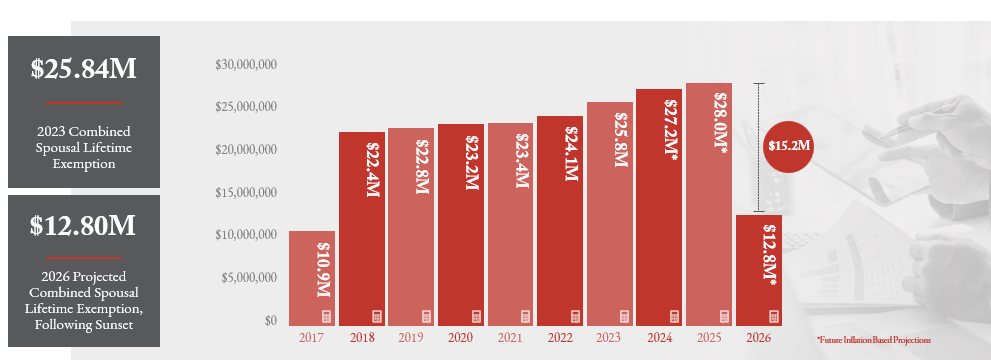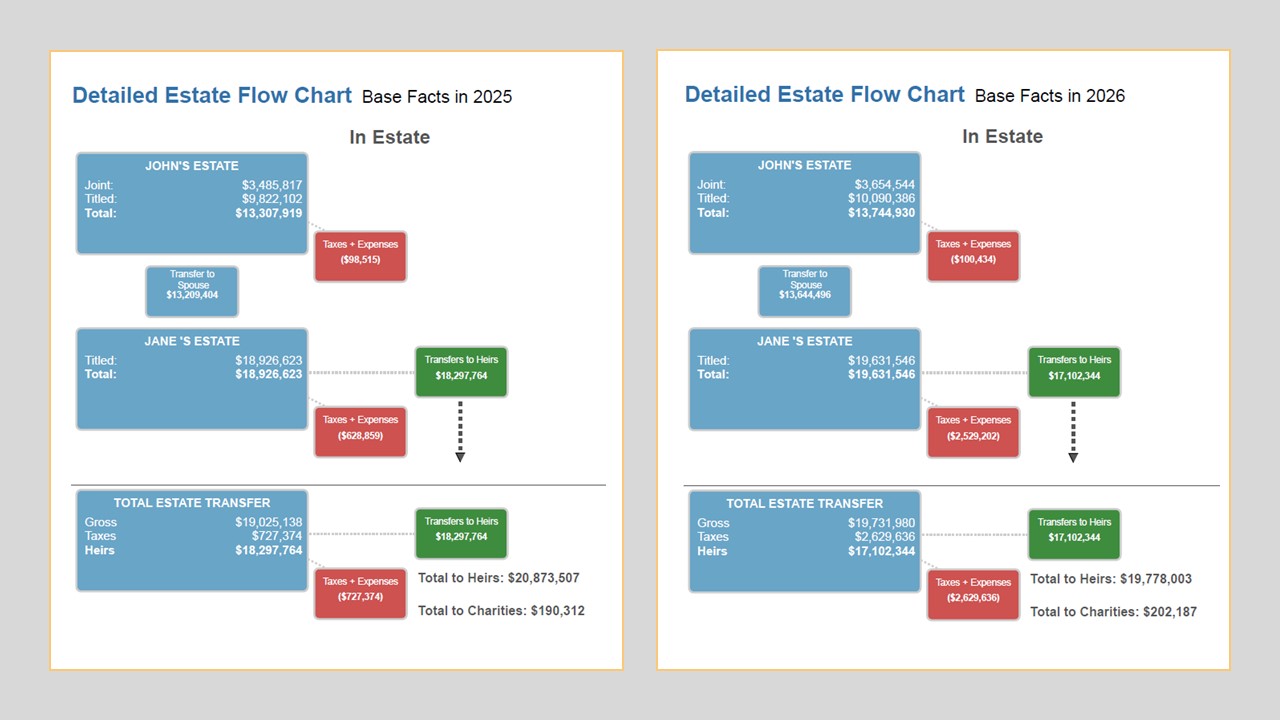When I think about the estate tax law environment over the past couple of decades, I am reminded of the phrase, “The only thing that stays the same is everything changes.” Those within the estate planning community, including attorneys, CPAs and professionals in investment and Fiduciary roles, are continuously tasked with staying updated on legal developments, identifying planning strategies that benefit clients, and evaluating their durability against IRS examination.
An early lesson in my career was the caution against allowing the “tax tail to wag the dog.” In other words, effective estate planning depends not just on tax optimization but also on a client’s readiness to engage in a proactive and meaningful estate planning process.
Some obstacles that often arise, are:
- Confidentiality: The client may not be comfortable sharing aspects of his or her financial condition to heirs, or in some cases, spouses.
- Sustainability: Clients may struggle over the permanence of giving gifts during their lifetime as opposed to transferring assets upon death through an estate plan. (Will I have enough to maintain my current lifestyle?).
- Control: Relinquishing some measure of control over the assets that are being gifted/the ability to change the terms/beneficiaries/timing of the gifting process.
In most cases, these objections can be overcome if the process and planning techniques and objectives are clearly communicated and properly executed. A significant challenge, however, lies in the uncertainty of whether the law will sunset or the current exemptions will be extended. Various factors could influence the outcome leading up to or by January 1, 2026.
What We Know About the Estate Tax Sunset
- The term “estate tax sunset” refers to the scheduled expiration of the enhanced estate tax exemptions introduced by the Tax Cuts and Jobs Act (TCJA) of 2017. These exemptions are slated to revert to their pre-2018 figures, adjusted for inflation, by January 1, 2026. Currently, individuals can transfer up to $13.61MM (per spouse, as of 2024) tax free through their estate, but post-sunset, this exemption is expected to be cut in half ($6 – 7.5MM per spouse depending on inflation) at the start of 2026, substantially impacting estate planning and tax liabilities.
- On November 26, 2019, the IRS provided reassurance through final regulations stating that complete gifts, over which the donor retains no control, would not be subject to retrospective tax claims or “clawback”. These are known as the “anti-clawback” regulations.
- Common gifting strategies that may be subject to clawback under the proposed regulations:
-
- Grantor Retained Annuity Trusts (GRATs): if the donor dies during the term of the GRAT
- Qualified Personal Residence Trust (QPRTs): if the donor dies during the term of the QPRT.
LIFETIME EXEMPTION TO SUNSET IN 2025

What Exactly is an Estate?
An individual’s estate includes all of the assets and liabilities they own or have a controlling interest in at the time of death. Understanding what is included in one’s estate is crucial for estate planning and tax purposes.
Assets include:
- Real Estate
- Financial Assets
- Cash & bank accounts
- Investments – stocks, bonds, mutual funds, annuities, etc.
- Retirement Accounts – IRAs, 401ks, pension plans, etc.
- Life Insurance Policies
- Personal Property – including cars, collectibles, art, electronics, furniture and other personal belongings
- Business Interests – including LLCs, partnerships and closely-held businesses
- Other Assets – including revocable trusts and intellectual property such as trademarks, royalties and copyrights
Liabilities and Debt include:
- Mortgages and home equity loans
- Personal Loans and credit card debt
- Medical bills
The net value (assets – liabilities) is crucial for estate planning and considering whether the taxation sunset may impact you and your family.
What Are Some Effective Planning Techniques to Consider?
- Outright gifts (As of 2024 annual exclusion gifts are $18,000 per person, per year or $36,000 for married couples. Lifetime exclusion gifts are $13,610,000 )
- Spousal Lifetime Access Trusts (SLATs) involve one spouse setting up an irrevocable trust to benefit the other spouse.
- This is commonly arranged by both spouses, but the trusts must not be mirror images of each other in order to avoid the “reciprocal trust doctrine.” This doctrine could lead to the inclusion of trust assets in the estate of the deceased spouse upon death.
- Assets in Family Limited Partnerships (FLPs) or Family LLC’s that qualify for valuation discounts:
- Assets that have significantly increased in value are the most advantageous.
- Leveraging highly appreciated assets, in conjunction with the discount for lack of marketability when these assets are placed within a Partnership or Corporate structure (reflecting minority ownership and lack of marketability), ensures the highest benefit for the client.
How Does this Impact Individuals and Business Owners?
The rollback of these exemptions will directly impact how much of your estate can be passed on to your heirs without incurring federal estate taxes. For many, this means that assets previously exempt from estate taxes could now be taxable, significantly affecting the inheritances of future generations. Business owners, in particular, face the challenge of ensuring their life’s work—their business—can be passed on without being liquidated in order to cover estate tax obligations.
Another important item to factor in? Future dollars. Invested dollars grow over time. A couple worth $12 million today could be worth $38.5 million (assuming a 6% growth rate) in 20 years.
To illustrate the difference in how a client’s statement may look between December 31, 2025, and January 1, 2026, let’s consider a hypothetical scenario. Imagine this: due to the Tax Cuts and Jobs Act, the rules around estate tax exemptions are about to shift back to where they were before 2018. We’ll assume the client has a sizable estate that would be affected by these changes.

This comparison highlights the significant impact the estate tax sunset could potentially have on estate planning and tax liabilities. It underscores the urgency for individuals with sizable estates to start planning ahead, before the end of 2025, in order to soften the financial impact of these changes.
Summary
Like so many aspects of our business and in life itself, we lack the foresight of a crystal ball. We have no way to predict with absolute certainty what the estate tax landscape will be in January 2026. The sunset presents both challenges and opportunities for estate planning.
By understanding the upcoming changes and employing strategic planning with the assistance of experts, you can navigate these changes effectively, ensuring your legacy and hard-earned wealth are preserved for future generations. The key is to act now, leveraging current exemptions and exploring avenues to protect your assets from the impending shift in estate tax regulations.
Watch our webinar below:
Under the current Tax Cuts and Job Act of 2017, individuals can transfer up to $13.61 million (per spouse, as of 2024) tax-free through their estate. But starting January 1, 2026, that exemption is expected to be cut in half, substantially affecting estate planning and tax liabilities. It’s not too early to start thinking and preparing for this change, now.
Featuring the following discussions:
Legal Ramifications for Families, Businesses & Beyond
Ronald P. Davis | Counsel, Estate, Trust & Business Planning | Maynard Nexsen PC, Mobile, AL
Your Business is Your Wealth: Preparing Your Company & Your Family
Rob Snowden, ASA. ABV | Founder & Managing Director | South Park Advisors, Charlotte, NC
What is the Estate Tax Sunset & Why Start Planning Now
Richard Littrell | Wealth Management Advisor | Oakworth Capital Bank, Central Alabama Market
What is the Estate Tax Sunset & Why Start Planning Now
John Hensley, CFP® | Wealth Management Advisor | Oakworth Capital Bank, South Alabama Market
Want to learn more? Read more from our Estate Tax Series.
This information is being provided for informational and educational purposes and is not meant to be taken as specific advice. All decisions regarding the legal implications of these strategies should be discussed with your advisors before being implemented.


